#Congressional Record
Photo

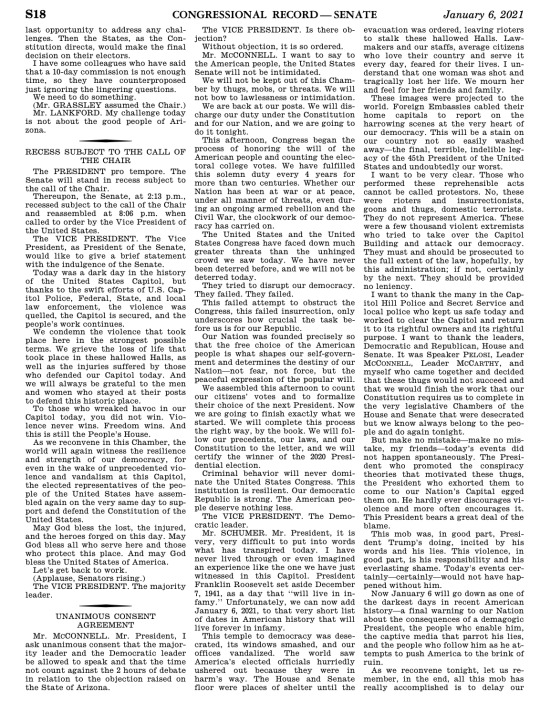
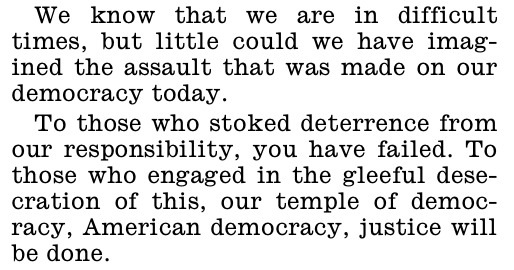
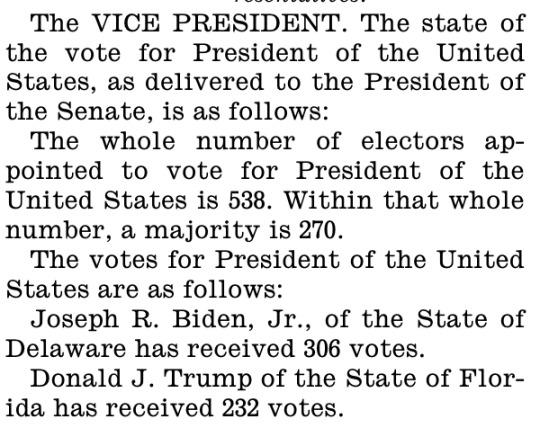
Amy Klobuchar, US Senator from Minnesota, on January 6 2021, prior to recess: “January 6 is not typically a day of historical significance for our country. For centuries, this day is simply the day that we receive each State’s certified electoral votes, and it has come and gone without much fanfare.”
Proceedings and Debates of the 117th Congress, First Session. Congressional Record 167, issue 4 (2021, January 6). Full text available at: https://www.govinfo.gov/app/details/CREC-2021-01-06/summary
4 notes
·
View notes
Text
The Mossadegh Project
#iran#iranian#tehran#middle east#soviet union#russia#russian imperialism#mossadegh#congressional record#congress#us congress#rhode island#democrats#us politics#history#mutual security#national security#us government#america#united states#us history#cold war#foreign policy#foreign affairs#1950's
1 note
·
View note
Text
Congressional Responses to Dobbs
With all of the attention focused on the Supreme Court in light of the Dobbs decision Congress' responses have been largely ignored. Here is some context for how Congress' response to Dobbs has gone so far.
The Supreme Court released its opinion in Dobbs v. Jackson Women’s Health on June 24, 2022. Within a little over a month of the release, a robust discussion developed within both Houses of Congress on whether there should be a legislative response to this decision. Congress is notorious for lots of discussion combined with little action. Based on Congress’ recent history, perhaps nothing will…

View On WordPress
#Andrew Clyde#Barbara Lee#Bob Good#Bowers v. Hardwick#Congressional Record#Dick Durbin#Employment Division v. Smith#Lawrence v. Texas#Lisa Murkowski#Reproductive Freedom Act#Respect for Marriage Act#RFRA#Scott Peters#Sylvia Garcia#Voteview
0 notes
Link
Names change.
This bill was up for debate in the Senate yesterday, and as you see from the link, it is about security for the Supreme Court. The Senate attempted to pass this a few months ago but the House made changes. As per the Constitution, any funding bill must start in the House, so in order to start it in the Senate, Senate Majority Leader Charles “Chuck” Schumer took the Legislative Branch Appropriations Act of 2022 and amended it with a substitute. This is common trickery used to get around that Constitutional limitation. The original bill passed the House but was discarded when all of the appropriations bills were consolidated into the final budget bills. So, even though it is NOT the Legislative Branch Appropriations, the Congressional Record still lists it as so:
“ H.R. 4346 (Rep. Ryan): A bill making appropriations for Legislative Branch for the fiscal year ending September 30, 2022, and for other purposes. -- Cloture on the motion to concur in the House amendment to the Senate amendment to H.R. 4346 with an amendment (SA 5135) invoked in Senate by Yea-Nay Vote. 64 - 32. Record Vote Number: 268 -- Considered by Senate (Message from the House considered). “
So, no, the Senate did not vote on the Legislative Branch Appropriations Act yesterday, which is H.R. 8237. That bill still has not passed the House though it’s possible it may by the end of the week, along with the other three I posted about previously.
#Congressional Record#Senate#Senate Majority Leader#Senator Charles Schumer (D-NY)#Legislative Branch#Supreme Court#name change#H.R. 8237#Two months left#Government Shutdown?
0 notes
Text
i’m a lifelong UFO weirdo so here’s some highlights of the House Oversight Committee’s public hearing on UAPs/UFOs:
- There’s no chance these craft are from secret US government testing programs because they have specific testing fields that assets in development cannot leave without significant notice and military approval.
- Other world governments also know about this phenomenon. A declassified treaty included parameters for joint international de-escalation in the event of a “malevolent UAP event.”
- All of the craft defy our current understanding of physics. They also look real weird. Descriptions given include a floating metal sphere with no visible propulsion and a black cube encased in a clear sphere.
- Nonhuman biologics have been recovered with crashes. Documentation of this exists.
- Nonhumans are no more infallible than us and also experience “mission failures,” which result in occasional manned and unmanned crashes.
- The first documented UFO incidents by the US military predate most of our advanced programs (1940s).
- UAPs have retaliated against humans, but the how’s and why’s were not given.
- There is a section of government that has been aggressively covering up the existence of UAPs/nonhuman remains, and they have used violence/the threat of violence to silence witnesses.
- There is a list of witnesses, which will be provided to the committee in a closed door session, that have firsthand knowledge/interaction with these craft. There is also a list of US defense contractors in possession of UAPs that is also being given to Congress in the closed door session.
- UAPs are difficult to document, even with our current technology, because they can shut down information collection systems in our most advanced planes. One photo of a UAP shot down recently had to be taken manually by the pilot.
- UAP encounters are now so common that they’re included as part of military pilots’ pre-flight briefings.
- “Has the US government contacted or communicated with nonhumans?” (long pause) “That is not a question I’m allowed to answer publicly.”
- At the end of the hearing: “We’ve made history here today.”
- Congress intends to follow up on this matter, and will invoke specific laws to bypass security classifications if necessary.
#current events#us politics#i guess#ufos#ufo news#uap#this is and i cannot stress this enough#a matter of congressional record now#and is beginning the process of discovery and disclosure#government moves slow but#this is the beginning#and i honestly never thought i would see it
201 notes
·
View notes
Note
Idk if you’re following the FTX crypto drama, but apparently they used QuickBooks for accounting in their company.
oh yeah there's been a lot of fun news about FTX, i've been cracking up all day
“The last few months have been difficult enough for everyone that it feels unremarkable to me, in comparison, that I need to put on the official Congressional Record that I am, and for most of my adult life have been, sad.”
#original#I need to put on the official Congressional Record that I am and for most of my adult life have been sad.#mycrimes.txt
194 notes
·
View notes
Text

🥲
#the background to this is more involved than I’d expected#apparently the bar on federal government copyright only dates to the 1895 Printing Act#which was passed to stop the compiler of these volumes of presidential statements—James Richardson—from asserting copyright in the thing#but were *TR's* presidential statements uncopyrightable as of 1907?#not under the 1895 Act unless published by the government during his time in office—§52 only bars copyright in government publications#so the 1895 Act precludes e.g. copyright in the president’s messages to Congress (§73) and veto messages (by operation of Art. I § 7 cl. 2)#but—presumably—not privately published (i.e. reported) or unpublished presidential statements#(this was before the 1978 Presidential Records Act asserted government ownership over the president’s records)#and presumably not under the government edicts doctrine either#unless the statements were made in the exercise or discharge of the president’s powers or duties#(e.g. commands as C-in-C or directions as CEO or communications with foreign governments)#but otherwise? political speeches? speeches to the public? statements made outside congressional sessions? probably not covered!#so! 🥲 in fact and not just sardonically
11 notes
·
View notes
Text

#us politics#2022#2022 midterms#2022 elections#colorado#Colorado district 3#gop#republicans#conservatives#congressional voting record#voting rights act#chips act#violence against women act#american rescue plan#rep. lauren boebert
32 notes
·
View notes
Text
remembered how it was a big deal that pete davidson was the first snl cast member born in the 90s (and only one for a while since he was SO young) and i thought hm have any more 90s kids joined snl? and now i'm five pages deep into a spreadsheet analysis
#chloe troast who joined this season was born in 1997 ??? EXCUSE ME#snl#post.me#my love of spreadsheets is simply unmatched#i have spreadsheets comparing congressional records on DOMA to the codifying of gay marriage bill
2 notes
·
View notes
Text
Congresswoman Rashida Tlaib submits to the Congressional Record the entire South African genocide case against Israel and makes an impassioned call to Congress to stop funding the ongoing atrocities in Gaza.
#palestine#jerusalem#free gaza#rashida tlaib#فلسطين#south africa#Usa#congress#Icj#gaza#free palestine#israel#i stand with palestine
15K notes
·
View notes
Text
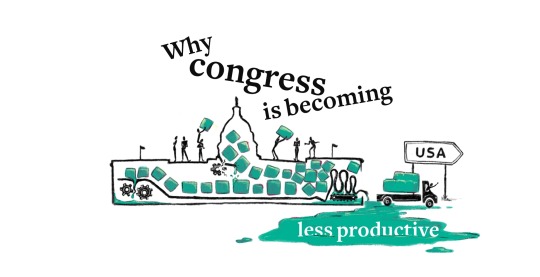
Illustration and Design By Ally J. Levine
— By Moira Warburton | Published March 12, 2024
The U.S. Congress is navigating yet another government funding deadline — the eighth in less than six months — and are at an impasse over sending aid to key allies in Ukraine, Taiwan and Israel. Divisions among Republicans in the House and Senate killed a major bipartisan border policy bill. Reforms to bedrock programs like Medicare and Social Security are desperately needed but no closer to getting passed. Meanwhile, the House of Representatives spent close to a month without a speaker last year due to infighting between moderate and hard right factions of the Republican party.
When U.S. Representative Chip Roy, a Republican from Texas, begged his colleagues in November to “give me one thing I can campaign on and say we did,” he was articulating what many lawmakers and observers were feeling: Congress isn’t working.
The simplest expression of this is the number of bills passed by Congress. Just twenty-seven bills were passed last year — a record low — but even before that, the number of bills signed into law by the president has been falling.
Congress Is Passing Fewer Laws
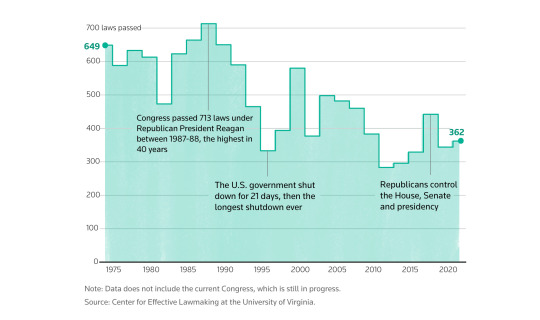
Experts point to several reasons for this. One key factor is an increase in polarization — Democrats and Republicans are farther apart ideologically than they’ve been in the last 50 years, according to an analysis by the nonpartisan Pew Research Center. That’s led to a decrease in bipartisanship, a necessary ingredient for bills to pass in a governing body full of checks and balances.
Fewer bills getting through to the president’s desk means the small number of mandatory ones that Congress must pass — such as government funding or annual legislation authorizing defense policies — are getting longer, said Molly Reynolds, senior fellow in governance studies at the Brookings Institution, as lawmakers try to jam the bills with policies that wouldn’t otherwise get a vote.
“Those large packages have come to bear more of Congress’s legislating,” she said. A longer bill takes more time to read, debate and get voted on, slowing down the process further.
Drawing of a truck carrying an oversized load of green boxes. People are throwing boxes on and off the truck, seemingly in disagreement about what the truck should be carrying.
With more policies being shoved into bills increasing in length, the use of policies known as “poison pills” is another hurdle — partisan policies that will be completely unacceptable to the other party. Case in point: Republicans attempting to ban mail delivery of abortion pills via a crucial agriculture funding bill that must be reauthorized every five years.
The length of bills “represents an increasing dysfunction in the institution,” Michael Thorning, director of structural democracy at the Bipartisan Policy Center, said. “Congress has difficulty taking action on a lot of individual pieces because of the politics or because of time constraints, and it’s easier to package some of these things up into ‘must pass’ bills… And then it’s a question of, ‘What can we add to this before it becomes so top heavy that it topples over?’”
The spikes in the number of bills passed correlate with periods when one party controlled all levers of government — House, Senate and the White House. But even when one party controls the majority, “unified party control is not doing as much work as it used to,” Sarah Binder, a professor of political science at George Washington University, said. “The minority party has become especially increasingly aggressive in using the rules of the game, particularly in the Senate, in blocking measures from even going to the floor.”
That can be seen in the number of measures passed by each chamber of Congress, which is falling too.
Fewer Measures Passed In Congress
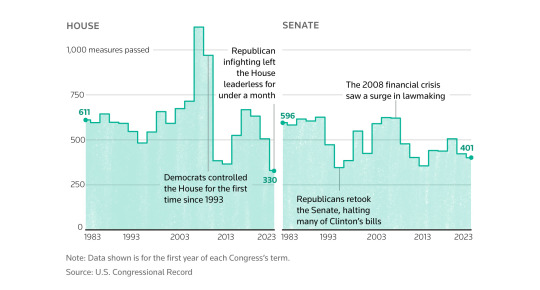
Another more elusive factor in Congress’s decreasing productivity is that members are spending less time talking to each other. A typical senator’s schedule includes flying back to Washington, D.C., on Monday for votes in the evening, then flying back to their home state on Thursday evening. The “Senate Friday” effect is commonly cited among reporters and staffers on the Hill – a sudden surge in activity on Thursday afternoons, as senators rush to finish any votes so they can go home for the weekend.
The House more often has votes Friday morning, but there is still an expectation of going back to the district for a longer weekend, plus recesses when lawmakers are home for weeks at a time. That Monday to Thursday schedule leaves just two full days for a laundry list of work.
Drawing of people standing on opposite sides of a chasm. Their body language, many standing with crossed arms, indicate frustration with the people on the opposite platform.
“Congress is not spending enough time in Washington to get the basics done,” Thorning said. The shortened in-person schedule “really interferes with members’ one opportunity to interact with each other, to learn collectively, to ask questions of witnesses collectively.”
Representative Derek Kilmer, a Democrat who chaired the now-defunct House Select Committee on the Modernization of Congress, said the issue of Congress’s shortened schedule was the main thing he would fix if given a choice.
“Part of the reason why when people are watching C-SPAN and no one’s there, it’s because they’re on three other committees at the same time,” he told Reuters. “The dynamic that creates is members ping pong from committee to committee. It’s not a place of learning or understanding. You airdrop in, you give your five minute speech for social media, you peace out.”
“Time is the biggest challenge,” Representative William Timmons, Kilmer’s Republican counterpart on the modernization committee, agreed. “We have to build trust with our colleagues, and we don’t have the time to build the trust with our colleagues.”
The amount of action happening on the floor isn’t a perfect representation of how much Congress is talking to each other – lots of action happens in committee rooms or briefings – but it is a marker of a decrease in action taking place in the main arena where lawmaking was intended to occur.
Less Action on The Floors of Congress
Fewer pages of proceedings are being recorded by the Congressional Record, which publishes all debates and speeches that take place on the floor in the House and Senate.

It is not clear how these hurdles to productivity will be solved. Part of the problem is that the current Republican Party holds a tiny majority in the House of just five seats, giving disproportionate power to any small group of members who wish to exert their influence, as seen by the far right House Freedom Caucus repeatedly blocking legislation it disagrees with, even though it was put forward by their own party, much to the frustration of their colleagues.
“We’ve had divided government in earlier periods and haven’t seen this level of low legislative productivity,” Craig Volden, director of the Center for Effective Lawmaking at the University of Virginia, said. “The question is, what is the Republican Party going to sort itself into, in terms of its main priorities, and what is the best strategy they see as advancing those priorities?”
Timmons acknowledged facing this issue himself.
“I have somebody running against me (in the primary election) that agrees with all the votes that I make, he just doesn’t agree that I don’t scream and yell,” he told Reuters. “Next Congress we’re going to have to figure out how to relearn the muscle memory of voting as one… If we have a narrow majority and we can’t do anything, that’s not good.”
Kilmer is part of a wave of lawmakers retiring Congress – 45 at time of publication, not the highest number on record but enough to draw attention. But he remains optimistic about Congress’s ability to change.
“I don't think it's a secret that Congress is a fixer upper,” he said.
Sources: U.S. Congressional Record, Center for Effective Lawmaking at the University of Virginia
Edited By: Julia Wolfe and Alistair Bell
#United States Congress#Less Action#Fewer Measures Passed#Passing Fewer Laws#Why Less Productive#United States 🇺🇸#House | Senate#U.S. Congressional Record#Center for Effective Lawmaking | The University of Virginia#Moira Warburton#Reuters.Com
0 notes
Text
"Congressional interns and fellows released a letter on Monday accusing Congress of having “suppressed and ignored” a tidal wave of constituent support for a permanent cease-fire in the Israel-Gaza conflict.
More than 140 interns and fellows signed the letter, and 71 disclosed the number of calls and emails in support of a cease-fire that their offices have recorded. Those 71 offices (out of the total of 535) have received a total of 693,170 messages supporting a cease-fire since Israel’s bombing of the Gaza Strip began in early October."
But in spite of constituents’ outreach, most senators and representatives have refused to publicly support a cease-fire — and privately, the letter said, many senior staffers responsible for briefing members of Congress are downplaying the number and intensity of the calls.
“In some cases, Members of Congress are not being adequately briefed about the volume or contents of these messages,” the letter says. “In several instances, senior staff have deliberately provided inaccurate information about these data to Members. In other cases, Members have willfully ignored the pleas of large swaths of their constituents.”
...
“While we refrain from telling our bosses how to do their jobs, as congressional interns and fellows, we owe it to the American people to expose the patent malpractice of Congress,” the letter says. “We can no longer stand by while the voices of constituents are suppressed and ignored by their elected officials.”
The letter came together after interns and fellows in several offices witnessed senior staff downplaying the number of calls and emails supporting a cease-fire, one of the letter’s organizers told HuffPost. In his office, a senior staffer quoted a number to the congressman that was 3,000 less than the actual number of callers, the organizer said.
“It’s very deliberate,” he said. “They see these overwhelming numbers, and they decrease it.”
Capitol Hill Interns Accuse Congress Of Suppressing Cease-Fire Demands
The workers in 71 congressional offices have recorded a total more than 690,000 calls for a cease-fire, but most are "unnoticed and unheard," an open letter said.
By Molly Redden
1K notes
·
View notes
Link
The Mossadegh Project
#iran#congress#us congress#congressional record#united states congress#iranian#tehran#mossadegh#shah of iran#us foreign policy#middle east#iran revolution#politics#foreign policy#foreign affairs#foreign relations#united states#capitol hill#washington dc#iranian revolution#iranian regime#islamic republic of iran#iranians
0 notes
Text
A painful reality check shows the 600-mile-long Ukrainian-Russian front in a figurative and literal freeze, draining Ukrainian resources and lives without much prospect for change in the foreseeable future. The much-anticipated Ukrainian counteroffensive of the past six months exacted a huge cost in casualties and matériel, but barely nudged the front lines. Ukraine’s top military commander has said the fight is at a “stalemate” — a notion deemed taboo not long ago — and only an unlikely technological breakthrough by one side or the other could break it. [...]
The way things are going, “Ukraine will for the foreseeable future harbor Europe’s most dangerous geopolitical fault line,” [...] an endless conflict that deepens Russia’s alienation from the West, enshrines Putinism and delays Ukraine’s integration into Europe.
That, at least, is the bleak prognosis if victory in the war continues to be defined in territorial terms, specifically the goal of driving Russia out of all the Ukrainian lands it occupied in 2014 and over the past 22 months, including Crimea and a thick wedge of southeastern Ukraine, altogether about a fifth of Ukraine’s sovereign territory.
But regaining territory is the wrong way to imagine the best outcome. True victory for Ukraine is to rise from the hell of the war as a strong, independent, prosperous and secure state, firmly planted in the West.[...]
the only way to find out if Mr. Putin is serious about a cease-fire, and whether one can be worked out, is to give it a try.
Halting Russia well short of its goals and turning to the reconstruction and modernization of Ukraine would be lasting tributes to the Ukrainians who have made the ultimate sacrifice to preserve the existence of their nation. And no temporary armistice would forever preclude Ukraine from recovering all of its land.
With U.S. and European aid to Ukraine now in serious jeopardy, the Biden administration and European officials are quietly shifting their focus from supporting Ukraine’s goal of total victory over Russia to improving its position in an eventual negotiation to end the war, according to a Biden administration official and a European diplomat based in Washington. Such a negotiation would likely mean giving up parts of Ukraine to Russia.
The White House and Pentagon publicly insist there is no official change in administration policy — that they still support Ukraine’s aim of forcing Russia’s military completely out of the country. [...]
The administration official told POLITICO Magazine this week that much of this strategic shift to defense is aimed at shoring up Ukraine’s position in any future negotiation. “That’s been our theory of the case throughout — the only way this war ends ultimately is through negotiation,” said the official, a White House spokesperson who was given anonymity because they are not authorized to speak on the record.[...]
“Those discussions [about peace talks] are starting, but [the administration] can’t back down publicly because of the political risk” to Biden, said a congressional official who is familiar with the administration’s thinking and who was granted anonymity to speak freely.[...]
The European diplomat based in Washington said that the European Union is also raising the threat of expediting Ukraine’s membership in NATO to “put the Ukrainians in the best situation possible to negotiate” with Moscow.
That is a flashpoint for Putin, who is believed to be mainly interested in a strategic deal with Washington under which Ukraine will not enter NATO. [...]
For most of the conflict GOP critics have accused Biden of moving too slowly to arm the Ukrainians with the most sophisticated weaponry, such as M1A1 Abrams battle tanks, long-range precision artillery and F-16 fighter jets. In an interview in July Zelenskyy himself said the delays “provided Russia with time to mine all our lands and build several lines of defense.” [...]
The Ukrainians themselves are engaged in what is becoming a very public debate about how long they can hold out against Putin. With Ukraine running low on troops as well as weapons, Zelenskyy’s refusal to consider any fresh negotiations with Moscow is looking more and more politically untenable at home. The Ukrainian president, seeking to draft another half million troops, is facing rising domestic opposition from his military commander in chief, Gen. Valeriy Zaluzhnyi, and the mayor of Kyiv, Vitali Klitschko.
So what was all that for then [27 Dec 23]
437 notes
·
View notes
Text
Conspiratorialism and the epistemological crisis

I'm on tour with my new, nationally bestselling novel The Bezzle! Catch me next weekend (Mar 30/31) in ANAHEIM at WONDERCON, then in Boston with Randall "XKCD" Munroe! (Apr 11), then Providence (Apr 12), and beyond!

Last year, Ed Pierson was supposed to fly from Seattle to New Jersey on Alaska Airlines. He boarded his flight, but then he had an urgent discussion with the flight attendant, explaining that as a former senior Boeing engineer, he'd specifically requested that flight because the aircraft wasn't a 737 Max:
https://www.cnn.com/travel/boeing-737-max-passenger-boycott/index.html
But for operational reasons, Alaska had switched out the equipment on the flight and there he was on a 737 Max, about to travel cross-continent, and he didn't feel safe doing so. He demanded to be let off the flight. His bags were offloaded and he walked back up the jetbridge after telling the spooked flight attendant, "I can’t go into detail right now, but I wasn’t planning on flying the Max, and I want to get off the plane."
Boeing, of course, is a flying disaster that was years in the making. Its planes have been falling out of the sky since 2019. Floods of whistleblowers have come forward to say its aircraft are unsafe. Pierson's not the only Boeing employee to state – both on and off the record – that he wouldn't fly on a specific model of Boeing aircraft, or, in some cases any recent Boeing aircraft:
https://pluralistic.net/2024/01/22/anything-that-cant-go-on-forever/#will-eventually-stop
And yet, for years, Boeing's regulators have allowed the company to keep turning out planes that keep turning out lemons. This is a pretty frightening situation, to say the least. I'm not an aerospace engineer, I'm not an aircraft safety inspector, but every time I book a flight, I have to make a decision about whether to trust Boeing's assurances that I can safely board one of its planes without dying.
In an ideal world, I wouldn't even have to think about this. I'd be able to trust that publicly accountable regulators were on the job, making sure that airplanes were airworthy. "Caveat emptor" is no way to run a civilian aviation system.
But even though I don't have the specialized expertise needed to assess the airworthiness of Boeing planes, I do have the much more general expertise needed to assess the trustworthiness of Boeing's regulator. The FAA has spent years deferring to Boeing, allowing it to self-certify that its aircraft were safe. Even when these assurances led to the death of hundreds of people, the FAA continued to allow Boeing to mark its own homework:
https://www.youtube.com/watch?v=Q8oCilY4szc
What's more, the FAA boss who presided over those hundreds of deaths was an ex-Boeing lobbyist, whom Trump subsequently appointed to run Boeing's oversight. He's not the only ex-insider who ended up a regulator, and there's plenty of ex-regulators now on Boeing's payroll:
https://therevolvingdoorproject.org/boeing-debacle-shows-need-to-investigate-trump-era-corruption/
You don't have to be an aviation expert to understand that companies have conflicts of interest when it comes to certifying their own products. "Market forces" aren't going to keep Boeing from shipping defective products, because the company's top brass are more worried about cashing out with this quarter's massive stock buybacks than they are about their successors' ability to manage the PR storm or Congressional hearings after their greed kills hundreds and hundreds of people.
You also don't have to be an aviation expert to understand that these conflicts persist even when a Boeing insider leaves the company to work for its regulators, or vice-versa. A regulator who anticipates a giant signing bonus from Boeing after their term in office, or a an ex-Boeing exec who holds millions in Boeing stock has an irreconcilable conflict of interest that will make it very hard – perhaps impossible – for them to hold the company to account when it trades safety for profit.
It's not just Boeing customers who feel justifiably anxious about trusting a system with such obvious conflicts of interest: Boeing's own executives, lobbyists and lawyers also refuse to participate in similarly flawed systems of oversight and conflict resolution. If Boeing was sued by its shareholders and the judge was also a pissed off Boeing shareholder, they would demand a recusal. If Boeing was looking for outside counsel to represent it in a liability suit brought by the family of one of its murder victims, they wouldn't hire the firm that was suing them – not even if that firm promised to be fair. If a Boeing executive's spouse sued for divorce, that exec wouldn't use the same lawyer as their soon-to-be-ex.
Sure, it takes specialized knowledge and training to be a lawyer, a judge, or an aircraft safety inspector. But anyone can look at the system those experts work in and spot its glaring defects. In other words, while acquiring expertise is hard, it's much easier to spot weaknesses in the process by which that expertise affects the world around us.
And therein lies the problem: aviation isn't the only technically complex, potentially lethal, and utterly, obviously untrustworthy system we all have to navigate. How about the building safety codes that governed the structure you're in right now? Plenty of people have blithely assumed that structural engineers carefully designed those standards, and that these standards were diligently upheld, only to discover in tragic, ghastly ways that this was wrong:
https://www.bbc.com/news/64568826
There are dozens – hundreds! – of life-or-death, highly technical questions you have to resolve every day just to survive. Should you trust the antilock braking firmware in your car? How about the food hygiene rules in the factories that produced the food in your shopping cart? Or the kitchen that made the pizza that was just delivered? Is your kid's school teaching them well, or will they grow up to be ignoramuses and thus economic roadkill?
Hell, even if I never get into another Boeing aircraft, I live in the approach path for Burbank airport, where Southwest lands 50+ Boeing flights every day. How can I be sure that the next Boeing 737 Max that falls out of the sky won't land on my roof?
This is the epistemological crisis we're living through today. Epistemology is the process by which we know things. The whole point of a transparent, democratically accountable process for expert technical deliberation is to resolve the epistemological challenge of making good choices about all of these life-or-death questions. Even the smartest person among us can't learn to evaluate all those questions, but we can all look at the process by which these questions are answered and draw conclusions about its soundness.
Is the process public? Are the people in charge of it forthright? Do they have conflicts of interest, and, if so, do they sit out any decision that gives even the appearance of impropriety? If new evidence comes to light – like, say, a horrific disaster – is there a way to re-open the process and change the rules?
The actual technical details might be a black box for us, opaque and indecipherable. But the box itself can be easily observed: is it made of sturdy material? Does it have sharp corners and clean lines? Or is it flimsy, irregular and torn? We don't have to know anything about the box's contents to conclude that we don't trust the box.
For example: we may not be experts in chemical engineering or water safety, but we can tell when a regulator is on the ball on these issues. Back in 2019, the West Virginia Department of Environmental Protection sought comment on its water safety regs. Dow Chemical – the largest corporation in the state's largest industry – filed comments arguing that WV should have lower standards for chemical contamination in its drinking water.
Now, I'm perfectly prepared to believe that there are safe levels of chemical runoff in the water supply. There's a lot of water in the water supply, after all, and "the dose makes the poison." What's more, I use the products whose manufacture results in that chemical waste. I want them to be made safely, but I do want them to be made – for one thing, the next time I have surgery, I want the anesthesiologist to start an IV with fresh, sterile plastic tubing.
And I'm not a chemist, let alone a water chemist. Neither am I a toxicologist. There are aspects of this debate I am totally unqualified to assess. Nevertheless, I think the WV process was a bad one, and here's why:
https://www.wvma.com/press/wvma-news/4244-wvma-statement-on-human-health-criteria-development
That's Dow's comment to the regulator (as proffered by its mouthpiece, the WV Manufacturers' Association, which it dominates). In that comment, Dow argues that West Virginians safely can absorb more poison than other Americans, because the people of West Virginia are fatter than other Americans, and so they have more tissue and thus a better ratio of poison to person than the typical American. But they don't stop there! They also say that West Virginians don't drink as much water as their out-of-state cousins, preferring to drink beer instead, so even if their water is more toxic, they'll be drinking less of it:
https://washingtonmonthly.com/2019/03/14/the-real-elitists-looking-down-on-trump-voters/
Even without any expertise in toxicology or water chemistry, I can tell that these are bullshit answers. The fact that the WV regulator accepted these comments tells me that they're not a good regulator. I was in WV last year to give a talk, and I didn't drink the tap water.
It's totally reasonable for non-experts to reject the conclusions of experts when the process by which those experts resolve their disagreements is obviously corrupt and irredeemably flawed. But some refusals carry higher costs – both for the refuseniks and the people around them – than my switching to bottled water when I was in Charleston.
Take vaccine denial (or "hesitancy"). Many people greeted the advent of an extremely rapid, high-tech covid vaccine with dread and mistrust. They argued that the pharma industry was dominated by corrupt, greedy corporations that routinely put their profits ahead of the public's safety, and that regulators, in Big Pharma's pocket, let them get away with mass murder.
The thing is, all that is true. Look, I've had five covid vaccinations, but not because I trust the pharma industry. I've had direct experience of how pharma sacrifices safety on greed's altar, and narrowly avoided harm myself. I have had chronic pain problems my whole life, and they've gotten worse every year. When my daughter was on the way, I decided this was going to get in the way of my ability to parent – I wanted to be able to carry her for long stretches! – and so I started aggressively pursuing the pain treatments I'd given up on many years before.
My journey led me to many specialists – physios, dieticians, rehab specialists, neurologists, surgeons – and I tried many, many therapies. Luckily, my wife had private insurance – we were in the UK then – and I could go to just about any doctor that seemed promising. That's how I found myself in the offices of a Harley Street quack, a prominent pain specialist, who had great news for me: it turned out that opioids were way safer than had previously been thought, and I could just take opioids every day and night for the rest of my life without any serious risk of addiction. It would be fine.
This sounded wrong to me. I'd lost several friends to overdoses, and watched others spiral into miserable lives as they struggled with addiction. So I "did my own research." Despite not having a background in chemistry, biology, neurology or pharmacology, I struggled through papers and read commentary and came to the conclusion that opioids weren't safe at all. Rather, corrupt billionaire pharma owners like the Sackler family had colluded with their regulators to risk the lives of millions by pushing falsified research that was finding publication in some of the most respected, peer-reviewed journals in the world.
I became an opioid denier, in other words.
I decided, based on my own research, that the experts were wrong, and that they were wrong for corrupt reasons, and that I couldn't trust their advice.
When anti-vaxxers decried the covid vaccines, they said things that were – in form at least – indistinguishable from the things I'd been saying 15 years earlier, when I decided to ignore my doctor's advice and throw away my medication on the grounds that it would probably harm me.
For me, faith in vaccines didn't come from a broad, newfound trust in the pharmaceutical system: rather, I judged that there was so much scrutiny on these new medications that it would overwhelm even pharma's ability to corruptly continue to sell a medication that they secretly knew to be harmful, as they'd done so many times before:
https://www.npr.org/2007/11/10/5470430/timeline-the-rise-and-fall-of-vioxx
But many of my peers had a different take on anti-vaxxers: for these friends and colleagues, anti-vaxxers were being foolish. Surprisingly, these people I'd long felt myself in broad agreement with began to defend the pharmaceutical system and its regulators. Once they saw that anti-vaxx was a wedge issue championed by right-wing culture war shitheads, they became not just pro-vaccine, but pro-pharma.
There's a name for this phenomenon: "schismogenesis." That's when you decide how you feel about an issue based on who supports it. Think of self-described "progressives" who became cheerleaders for the America's cruel, ruthless and lawless "intelligence community" when it seemed that US spooks were bent on Trump's ouster:
https://pluralistic.net/2021/12/18/schizmogenesis/
The fact that the FBI didn't like Trump didn't make them allies of progressive causes. This was and is the same entity that (among other things) tried to blackmail Martin Luther King, Jr into killing himself:
https://en.wikipedia.org/wiki/FBI%E2%80%93King_suicide_letter
But schismogenesis isn't merely a reactionary way of flip-flopping on issues based on reflexive enmity. It's actually a reasonable epistemological tactic: in a world where there are more issues you need to be clear on than you can possibly inform yourself about, you need some shortcuts. One shortcut – a shortcut that's failing – is to say, "Well, I'll provisionally believe whatever the expert system tells me is true." Another shortcut is, "I will provisionally disbelieve in whatever the people I know to act in bad faith are saying is true." That is, "schismogenesis."
Schismogenesis isn't a great tactic. It would be far better if we had a set of institutions we could all largely trust – if the black boxes where expert debate took place were sturdy, rectilinear and sharp-cornered.
But they're not. They're just not. Our regulatory process sucks. Corporate concentration makes it trivial for cartels to capture their regulators and steer them to conclusions that benefit corporate shareholders even if that means visiting enormous harm – even mass death – on the public:
https://pluralistic.net/2022/06/05/regulatory-capture/
No one hates Big Tech more than I do, but many of my co-belligerents in the war on Big Tech believe that the rise of conspiratorialism can be laid at tech platforms' feet. They say that Big Tech boasts of how good they are at algorithmically manipulating our beliefs, and attribute Qanons, flat earthers, and other outlandish conspiratorial cults to the misuse off those algorithms.
"We built a Big Data mind-control ray" is one of those extraordinary claims that requires extraordinary evidence. But the evidence for Big Tech's persuasion machines is very poor: mostly, it consists of tech platforms' own boasts to potential investors and customers for their advertising products. "We can change peoples' minds" has long been the boast of advertising companies, and it's clear that they can change the minds of customers for advertising.
Think of department store mogul John Wanamaker, who famously said "Half the money I spend on advertising is wasted; the trouble is I don't know which half." Today – thanks to commercial surveillance – we know that the true proportion of wasted advertising spending is more like 99.9%. Advertising agencies may be really good at convincing John Wanamaker and his successors, through prolonged, personal, intense selling – but that doesn't mean they're able to sell so efficiently to the rest of us with mass banner ads or spambots:
http://pluralistic.net/HowToDestroySurveillanceCapitalism
In other words, the fact that Facebook claims it is really good at persuasion doesn't mean that it's true. Just like the AI companies who claim their chatbots can do your job: they are much better at convincing your boss (who is insatiably horny for firing workers) than they are at actually producing an algorithm that can replace you. What's more, their profitability relies far more on convincing a rich, credulous business executive that their product works than it does on actually delivering a working product.
Now, I do think that Facebook and other tech giants play an important role in the rise of conspiratorial beliefs. However, that role isn't using algorithms to persuade people to mistrust our institutions. Rather Big Tech – like other corporate cartels – has so corrupted our regulatory system that they make trusting our institutions irrational.
Think of federal privacy law. The last time the US got a new federal consumer privacy law was in 1988, when Congress passed the Video Privacy Protection Act, a law that prohibits video store clerks from leaking your VHS rental history:
https://www.eff.org/deeplinks/2008/07/why-vppa-protects-youtube-and-viacom-employees
It's been a minute. There are very obvious privacy concerns haunting Americans, related to those tech giants, and yet the closest Congress can come to doing something about it is to attempt the forced sale of the sole Chinese tech giant with a US footprint to a US company, to ensure that its rampant privacy violations are conducted by our fellow Americans, and to force Chinese spies to buy their surveillance data on millions of Americans in the lawless, reckless swamp of US data-brokerages:
https://www.npr.org/2024/03/14/1238435508/tiktok-ban-bill-congress-china
For millions of Americans – especially younger Americans – the failure to pass (or even introduce!) a federal privacy law proves that our institutions can't be trusted. They're right:
https://www.tiktok.com/@pearlmania500/video/7345961470548512043
Occam's Razor cautions us to seek the simplest explanation for the phenomena we see in the world around us. There's a much simpler explanation for why people believe conspiracy theories they encounter online than the idea that the one time Facebook is telling the truth is when they're boasting about how well their products work – especially given the undeniable fact that everyone else who ever claimed to have perfected mind-control was a fantasist or a liar, from Rasputin to MK-ULTRA to pick-up artists.
Maybe people believe in conspiracy theories because they have hundreds of life-or-death decisions to make every day, and the institutions that are supposed to make that possible keep proving that they can't be trusted. Nevertheless, those decisions have to be made, and so something needs to fill the epistemological void left by the manifest unsoundness of the black box where the decisions get made.
For many people – millions – the thing that fills the black box is conspiracy fantasies. It's true that tech makes finding these conspiracy fantasies easier than ever, and it's true that tech makes forming communities of conspiratorial belief easier, too. But the vulnerability to conspiratorialism that algorithms identify and target people based on isn't a function of Big Data. It's a function of corruption – of life in a world in which real conspiracies (to steal your wages, or let rich people escape the consequences of their crimes, or sacrifice your safety to protect large firms' profits) are everywhere.
Progressives – which is to say, the coalition of liberals and leftists, in which liberals are the senior partners and spokespeople who control the Overton Window – used to identify and decry these conspiracies. But as right wing "populists" declared their opposition to these conspiracies – when Trump damned free trade and the mainstream media as tools of the ruling class – progressives leaned into schismogenesis and declared their vocal support for these old enemies of progress.
This is the crux of Naomi Klein's brilliant 2023 book Doppelganger: that as the progressive coalition started supporting these unworthy and broken institutions, the right spun up "mirror world" versions of their critique, distorted versions that focus on scapegoating vulnerable groups rather than fighting unworthy institutions:
https://pluralistic.net/2023/09/05/not-that-naomi/#if-the-naomi-be-klein-youre-doing-just-fine
This is a long tradition in politics: hundreds of years ago, some leftists branded antisemitism "the socialism of fools." Rather than condemning the system's embrace of the finance sector and its wealthy beneficiaries, anti-semites blame a disfavored group of people – people who are just as likely as anyone to suffer under the system:
https://en.wikipedia.org/wiki/Antisemitism_is_the_socialism_of_fools
It's an ugly, shallow, cartoon version of socialism's measured and comprehensive analysis of how the class system actually works and why it's so harmful to everyone except a tiny elite. Literally cartoonish: the shadow-world version of socialism co-opts and simplifies the iconography of class struggle. And schismogenesis – "if the right likes this, I don't" – sends "progressive" scolds after anyone who dares to criticize finance as the crux of our world's problems as popularizing "antisemetic dog-whistles."
This is the problem with "horseshoe theory" – the idea that the far right and the far left bend all the way around to meet each other:
https://pluralistic.net/2024/02/26/horsehoe-crab/#substantive-disagreement
When the right criticizes pharma companies, they tell us to "do our own research" (e.g. ignore the systemic problems of people being forced to work under dangerous conditions during a pandemic while individually assessing conflicting claims about vaccine safety, ideally landing on buying "supplements" from a grifter). When the left criticizes pharma, it's to argue for universal access to medicine and vigorous public oversight of pharma companies. These aren't the same thing:
https://pluralistic.net/2021/05/25/the-other-shoe-drops/#quid-pro-quo
Long before opportunistic right wing politicians realized they could get mileage out of pointing at the terrifying epistemological crisis of trying to make good choices in an age of institutions that can't be trusted, the left was sounding the alarm. Conspiratorialism – the fracturing of our shared reality – is a serious problem, weakening our ability to respond effectively to endless disasters of the polycrisis.
But by blaming the problem of conspiratorialism on the credulity of believers (rather than the deserved disrepute of the institutions they have lost faith in) we adopt the logic of the right: "conspiratorialism is a problem of individuals believing wrong things," rather than "a system that makes wrong explanations credible – and a schismogenic insistence that these institutions are sound and trustworthy."

If you'd like an essay-formatted version of this post to read or share, here's a link to it on pluralistic.net, my surveillance-free, ad-free, tracker-free blog:
https://pluralistic.net/2024/03/25/black-boxes/#when-you-know-you-know

Image:
Nuclear Regulatory Commission (modified)
https://www.flickr.com/photos/nrcgov/15993154185/
meanwell-packaging.co.uk
https://www.flickr.com/photos/195311218@N08/52159853896
CC BY 2.0
https://creativecommons.org/licenses/by/2.0/
#pluralistic#conspiratorialism#epistemology#epistemological crisis#mind control rays#opioid denial#vaccine denial#regulatory capture#boeing#corruption#inequality#monopoly#apple#dma#eu
291 notes
·
View notes
Text

Paul Adams 1920-2013, joined the Tuskegee Airmen shortly after graduating from South Carolina State University. He flew with the 332nd Fighter Squadron (the famed "Red Tails") throughout WWII. He would retire from the military in 1962. He then would become a teaching in the Lincoln (NE) public school system. They named Adams Elementary school for him in 2008.
Paul Adams and his fellow Tuskegee Airmen were the first African-American aviators in the U.S. military, whose distinguished record many historians credit with helping pave the way for the civil rights movement.
The group set an unprecedented record, flying more than 1,500 missions in Europe and North Africa. Adam served in nine major campaigns and received the Commendation Medal with three Oak Leaf clusters, each of which signifies subsequent bestowals of the same honor.
Doane College recognized him with the President's Honor of Distinction Award the same year. In 2007, he received the Congressional Gold Medal along with other Tuskegee Airmen, who were known as "guardian angels" by white airmen who were escorted by the African-American pilots during the war. Adams received a bronze replica at a ceremony in Lincoln. Doane College recognized him with the President's Honor of Distinction Award the same year.
And two years later, Adams, at President Barack Obama's invitation, attended the inauguration of the first black president along with other Tuskegee Airmen. Adams went on to become one of the first black teachers in LPS, and in 2008, his accomplishments were honored when the district named a new school after him.
He became a frequent visitor at Adams Elementary, where books about Tuskegee Airmen fill the library and teachers make a point to read them to students. The history became an integral part of Adams Elementary school
#black tumblr#black history#black literature#black excellence#black community#civil rights#black history is american history#blackexcellence365#tuskegee airmen#american history
217 notes
·
View notes